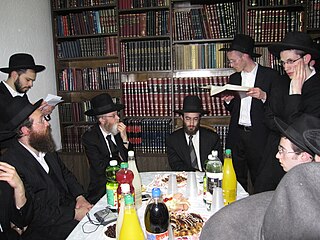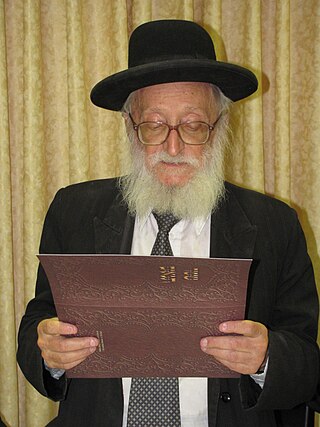Related Research Articles
Rabbi Adin Even-Israel Steinsaltz was an Israeli Chabad Chasidic rabbi, teacher, philosopher, social critic, author, translator and publisher.

Lilith, also spelt Lilit, Lilitu, or Lilis, is a female figure in Mesopotamian and Judaic mythology, theorized to be the first wife of Adam and supposedly the primordial she-demon. Lilith is cited as having been "banished" from the Garden of Eden for not complying with and obeying Adam. She is thought to be mentioned in Biblical Hebrew in the Book of Isaiah, and in Late Antiquity in Mandaean mythology and Jewish mythology sources from 500 CE onward. Lilith appears in historiolas in various concepts and localities that give partial descriptions of her. She is mentioned in the Babylonian Talmud, in the Book of Adam and Eve as Adam's first wife, and in the Zohar Leviticus 19a as "a hot fiery female who first cohabited with man". Many traditional rabbinic authorities, including Maimonides and Menachem Meiri, reject the existence of Lilith.

The Talmud is the central text of Rabbinic Judaism and the primary source of Jewish religious law (halakha) and Jewish theology. Until the advent of modernity, in nearly all Jewish communities, the Talmud was the centerpiece of Jewish cultural life and was foundational to "all Jewish thought and aspirations", serving also as "the guide for the daily life" of Jews.

The Gemara is an essential component of the Talmud, comprising a collection of rabbinical analyses and commentaries on the Mishnah and presented in 63 books. The term is derived from the Aramaic word גמרא and rooted in the Semitic word ג-מ-ר (gamar), which means "to finish" or "complete". Initially, the Gemara was transmitted orally and not permitted to be written down. However, after Judah the Prince compiled the Mishnah around 200 CE, rabbis from Babylonia and the Land of Israel extensively studied the work. Their discussions were eventually documented in a series of books, which would come to be known as the Gemara. The Gemara, when combined with the Mishnah, forms the full Talmud.

Torah study is the study of the Torah, Hebrew Bible, Talmud, responsa, rabbinic literature, and similar works, all of which are Judaism's religious texts. According to Rabbinic Judaism, the study is done for the purpose of the mitzvah ("commandment") of Torah study itself.
Daf Yomi is a daily regimen of learning the Oral Torah and its commentaries, in which each of the 2,711 pages of the Babylonian Talmud is covered in sequence. A daf, or blatt in Yiddish, consists of both sides of the page. Under this regimen, the entire Talmud is completed, one day at a time, in a cycle of approximately seven and a half years.

Yehuda Meir Shapiro, was a prominent Polish Hasidic rabbi and rosh yeshiva, also known as the Lubliner Rav. He is noted for his promotion of the Daf Yomi study program in 1923, and establishing the Chachmei Lublin Yeshiva in 1930.

Siyum HaShas is a celebration of the completion of the Daf Yomi program, a roughly seven-and-a-half-year cycle of learning the Oral Torah and its commentaries, in which each of the 2,711 pages of the Babylonian Talmud are covered in sequence – one page per day. The first Daf Yomi cycle began on the first day of Rosh Hashanah 5684 ; the thirteenth cycle concluded on 4 January 2020 and the fourteenth cycle began the following day, to be concluded on 7 June 2027. The Siyum HaShas marks both the end of the previous cycle and the beginning of the next, and is characterized by celebratory speeches, as well as singing and dancing. The next day, the new cycle begins again.

A siyum ("completion"), in Judaism, occasionally spelled siyyum, is the completion of any established unit of Torah study. The most common units are a single volume of the Talmud, or of Mishnah, but there are other units of learning that may lead to a siyum.

The magazine Lilith is an independent, Jewish-American, feminist non-profit publication that has been issued quarterly since 1976. The magazine features award-winning investigative reports, first-person accounts, entertainment reviews, fiction and poetry, art and photography. Topics range from rabbinic sexual misconduct, to new rituals and celebrations, to deconstructing Jewish-American stereotypes, to understanding the Jewish stake in abortion rights.

Chachmei Lublin Yeshiva was a Jewish educational institution (yeshiva) that operated in the city of Lublin, Poland from 1930 to 1939. At the time, it was one of the largest in the world.

Shmuel Herzfeld is an American Modern Orthodox rabbi. He previously served as the Senior Rabbi of Ohev Sholom - The National Synagogue in Washington, D.C. He is a teacher, lecturer, activist, and author.

Chona Menachem Mendel (Mendel) Weinbach was an Orthodox Jewish rabbi, educator, author, and speaker. As the co-founder and dean of Ohr Somayach Institutions, a Jerusalem-based yeshiva for newly-observant Jewish men, he was considered one of the fathers of the modern-day baal teshuva movement.

HenryAbramson is the dean of the Lander College of Arts and Sciences in Flatbush, New York. Before that, he served as the Dean for Academic Affairs and Student Services at Touro College's Miami branch. He is notable for his teachings on Jewish history and Judaism as a religion.
Kollel Bet Mordechai is a Kollel and Bet Midrash in Johannesburg, South Africa. It is associated with Mizrachi and is based at the Yeshiva College of South Africa.

Dirshu is an Orthodox Jewish international organization whose goal is to strengthen and encourage Torah study. Founded in 1997, the organization produces study cycles, sponsors shiurim, furnishes and grades tests, and offers financial incentives to individuals and groups to learn and master Talmud, Halakha, and Mussar texts. It has also published new editions of traditional Jewish texts, and sponsored major gatherings to celebrate the completion of its study cycles. As of 2018, more than 150,000 people have participated in its programs, which have spread to 26 countries on five continents.
Rabbanit Michelle Cohen Farber is the first woman to lead a Daf Yomi, a multi-year Jewish Talmud study cycle traditionally reserved for men. The women's Daf Yomi led by Farber noted its Siyum HaShas at the International Convention Center in Jerusalem on January 4–5, 2020. Her study group meets at her home in Raanana, Israel.
David Bashevkin is an American rabbi, writer, professor, and podcast host based in New York. He is currently Director of Education of NCSY, an Orthodox Union youth group.
Hadran is a Jewish women's Talmud study organization based in Jerusalem. The organization is the organizer of the Women's Siyum HaShas, a celebration which marks the seven-year daily study schedule of the Babylonian Talmud known as Daf Yomi.
Miriam Anzovin is an American-Jewish writer, artist and social media personality. Her work focuses on American Jewish communal life and is best known for her Daf Reactions series of videos explaining passages from the Talmud posted to TikTok and other social media platforms.
References
- ↑ "Standing Suspended in This Miracle". Lilith Magazine. Retrieved September 25, 2017.
- ↑ "Divorced and battling illness, rabbi's daughter finds her lifeline in the Talmud" . Retrieved September 14, 2017.
- ↑ "Ilana Kurshan: A delightful surprise – American Jewish World". American Jewish World. September 6, 2017. Retrieved September 14, 2017.
- ↑ "Talmud Tales: Ilana Kurshan's new book is inspired by 'Daf Yomi' studies". The Jerusalem Post | JPost.com. Retrieved September 14, 2017.
- ↑ Stern, Marissa (September 13, 2017). "Memoir Provides Engaging Look at Talmudic Text – Jewish Exponent". Jewish Exponent. Retrieved September 14, 2017.
- ↑ "Ilana Kurshan's Memoir Recounts Her Life in Israel, One Page of Talmud at a Time". Tablet Magazine. Retrieved September 14, 2017.
- ↑ Kasmer-Jacobs, Jessica (September 19, 2017). "The World's Largest Book Club". The Wall Street Journal. ISSN 0099-9660 . Retrieved September 25, 2017.
- ↑ "educators". Bronfman Fellows. Retrieved September 25, 2017.
- ↑ "Getting Personal About The Talmud". Jewish Week. Retrieved October 26, 2017.
- ↑ "Amazon.com: Ilana Kurshan: Books, Biography, Blog, Audiobooks, Kindle". Amazon.com. Retrieved September 14, 2017.
- ↑ "Masthead". Lilith Magazine. Retrieved September 14, 2017.
- ↑ "About Ilana Kurshan". Ilana Kurshan. March 20, 2016. Retrieved September 25, 2017.
- ↑ "A Snake, a Flood, a Hidden Baby: Bible Stories for Children | Jewish Book Council". www.jewishbookcouncil.org. 2021. Retrieved December 2, 2021.